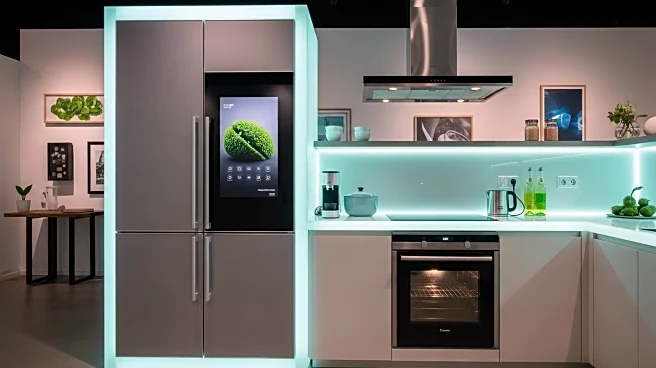What is the story about?
What's Happening?
Beko, a leading home appliance manufacturer, is reimagining the future of kitchen appliances by integrating artificial intelligence to enhance convenience, energy efficiency, and sustainability. The company envisions a kitchen that anticipates user needs, such as preheating ovens, suggesting low-energy recipes, and managing household essentials. This approach aims to transform kitchens into intelligent ecosystems that seamlessly integrate with daily routines while promoting a healthier planet. Beko emphasizes the importance of interoperability across devices and platforms, advocating for open standards to ensure smart appliances can easily integrate into broader smart-home systems. The company is also focusing on sustainability by optimizing appliance operations based on real-time energy pricing and promoting energy-saving modes.
Why It's Important?
The integration of AI in home appliances represents a significant shift towards more sustainable living, addressing the growing consumer demand for energy-efficient and cost-effective solutions. This development has the potential to reduce household energy consumption and costs, benefiting both consumers and the environment. By promoting open standards and interoperability, Beko is setting a precedent for the industry, encouraging collaboration among manufacturers, regulators, and technology partners. This could lead to widespread adoption of smart appliances, driving innovation and sustainability in the home appliance sector. The focus on sustainability also aligns with global efforts to reduce carbon footprints and promote environmental responsibility.
What's Next?
Beko's initiative may prompt other manufacturers to adopt similar strategies, potentially leading to a more competitive market for smart and sustainable appliances. As the industry moves towards open standards, consumers can expect greater compatibility and integration of smart devices in their homes. This could also lead to advancements in AI technology, further enhancing the capabilities of home appliances. Additionally, regulatory bodies may develop new guidelines to support the integration of sustainable practices in the manufacturing and operation of smart appliances. The success of Beko's approach could influence consumer expectations, driving demand for more intelligent and eco-friendly home solutions.
Beyond the Headlines
The shift towards intelligent and sustainable kitchen appliances raises ethical and cultural considerations, such as data privacy and the impact of AI on daily life. As appliances become more integrated into personal routines, manufacturers must ensure that data collected is used responsibly and securely. The cultural shift towards smart homes may also influence lifestyle changes, as consumers adapt to new technologies that offer convenience and efficiency. Long-term, this trend could lead to a reevaluation of traditional household roles and responsibilities, as technology increasingly supports daily tasks.















